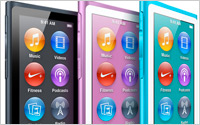Apple Wins Round In iTunes Billing Dispute
- by Wendy Davis @wendyndavis, April 22, 2013

In a preliminary victory for Apple, a federal judge has thrown out a lawsuit accusing the company of overcharging customers for iTunes tracks.
U.S.
District Court Judge Lucy Koh ruled that Robert Herskowitz of New York and Pennsylvania resident Phoebe Juel didn't allege sufficient facts to show that Apple breached its contract by allegedly
double-billing them. Koh dismissed their lawsuit without prejudice, meaning they can try to bolster their case with additional facts and file it again.
Herskowitz alleged in his lawsuit
that Apple charged him $2.58 for downloading the track “Whataya Want From Me,” instead of the $1.29 he expected to pay. He says that Apple refused to refund the difference due to its
no-refund policy.
Juel said in a separate complaint that she downloaded the same track twice, because she was unable to locate the music file on her computer after downloading it the first
time.
The two complaints were consolidated last year into one potential class-action in the Northern District of California. Juel and Herskowitz argue that Apple is violating its terms of
service, which says the company will only bill consumers once.
But Apple argued in a motion seeking dismissal that its iTunes agreement specifies that songs can't be replaced. The company
added that the iTunes agreement requires consumers to contact the company when technical problems prevent songs from downloading. Apple also argued that even though Herskowitz used
“ambiguous” language about being “charged more than once,” he actually downloaded the same song twice -- apparently because the first download failed.
“Plaintiffs do not allege that they contacted Apple to exercise their contractual rights to a remedy when the initial download of a song was unsuccessful. Instead, they both chose to purchase
and download the same song a second time, and were properly charged for those subsequent purchases,” Apple argued in its motion to dismiss the lawsuit.
Koh agreed with Apple. She said
last week in a written decision that Juel and Herskowitz hadn't alleged the type of facts that would show that Apple violated the terms of service. “By virtue of the express language of the
agreement, Juel was only entitled to download the song once. Therefore, the fact that she was charged twice for downloading a song twice does not amount to a breach of contract,” Koh wrote.
The judge also ruled that Herskowitz's complaint wasn't clear about whether Apple charged him twice for one song, or whether he purchased a single song twice. “Consequently, the Court
does not find that Herskowitz has sufficiently alleged and shown facts that provide the grounds for his entitlement to relief,” Koh wrote.
Koh gave Herskowitz and Juel until May 17 to
amend their complaints and file them again.


